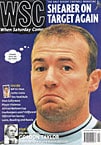 One Belgrade club has floundered since the assassination of their infamous and highly feared owner in 2000. Richard Mills reports
One Belgrade club has floundered since the assassination of their infamous and highly feared owner in 2000. Richard Mills reports
Earlier this year Serbian pop singer Svetlana “Ceca” Ražnatović was finally charged with embezzlement over the sale of footballers and the illegal possession of firearms. These charges date back nearly ten years and relate to transfers from Obilić Belgrade Football Club. Ceca took over the running of Obilić when her husband Željko “Arkan” Ražnatović was assassinated in 2000 after an extraordinary life which included bank robberies, prison breaks, commanding a paramilitary organisation and indictment for war crimes. In death Arkan continues to be a legendary figure among Serbian nationalists, but the plight of his football club has been less well documented.



